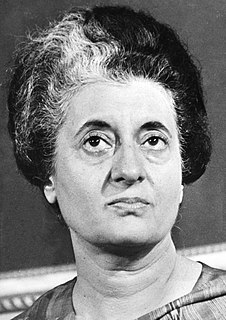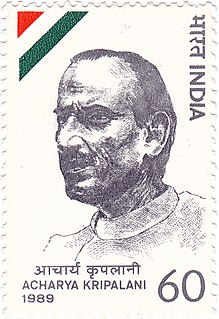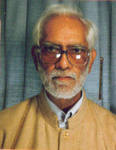
Indira Priyadarshini Gandhi was an Indian politician and a central figure of the Indian National Congress. She was elected as 3rd prime minister of India in 1966 and was also the first and, to date, only female prime minister of India. Gandhi was the daughter of Jawaharlal Nehru, the 1st prime minister of India. She served as prime minister from January 1966 to March 1977 and again from January 1980 until her assassination in October 1984, making her the second longest-serving Indian prime minister after her father.

Jayaprakash Narayan, popularly referred to as JP or Lok Nayak, was an Indian independence activist, theorist, socialist and political leader. He is remembered for leading the mid-1970s opposition against Prime Minister Indira Gandhi, for whose overthrow he had called for a "total revolution". His biography, Jayaprakash, was written by his nationalist friend and the writer of Hindi literature, Rambriksh Benipuri. In 1999, he was posthumously awarded the Bharat Ratna, India's highest civilian award, in recognition of his social service. Other awards include the Magsaysay award for Public Service in 1965.

The Janata Party was a political party that was founded as an amalgam of Indian political parties opposed to the Emergency that was imposed between 1975 and 1977 by Prime Minister Indira Gandhi of the Indian National Congress. In the 1977 general election, the party defeated the Congress and Janata leader Morarji Desai became the first non-Congress prime minister in independent modern India's history.

George Mathew Fernandes was an Indian trade unionist, statesman, and journalist, who served as the 22nd Defence Minister of India from 1998 until 2004. He was a member of Lok Sabha for over 30 years, starting from Bombay in 1967 till 2009 mostly representing constituencies from Bihar. He was a key member of the Janata Dal and the founder of the Samata Party. He held several ministerial portfolios including communication, industry, railways, and defence. In 2020, he was awarded Padma Vibhushan (posthumously).

Sanjay Gandhi was an Indian politician and the younger son of Indira Gandhi and Feroze Gandhi. He was a member of parliament, Lok Sabha and the Nehru–Gandhi family. During his lifetime, he was widely expected to succeed his mother as head of the Indian National Congress, but following his early death in a plane crash his elder brother Rajiv became their mother's political heir and succeeded her as Prime Minister of India after her assassination. His wife Maneka Gandhi and son Varun Gandhi are politicians in the Bharatiya Janata Party.
Socialist Party has been the name of several political parties in India, all of which have their roots in the Congress Socialist Party during the freedom struggle.

The Congress Socialist Party (CSP) was a socialist caucus within the Indian National Congress. It was founded in 1934 by Congress members who rejected what they saw as the anti-rational mysticism of Gandhi as well as the sectarian attitude of the Communist Party of India towards the Congress. Influenced by Fabianism as well as Marxism-Leninism, the CSP included advocates of armed struggle or sabotage (such as Yusuf Meherally, Jai Prakash Narayan, and Basawon Singh as well as those who insisted upon Ahimsa or Nonviolent resistance. The CSP advocated decentralized socialism in which co-operatives, trade unions, independent farmers, and local authorities would hold a substantial share of the economic power.

The Emergency in India was a 21-month period from 1975 to 1977 when Prime Minister Indira Gandhi had a state of emergency declared across the country. Officially issued by President Fakhruddin Ali Ahmed under Article 352 of the Constitution because of the prevailing "internal disturbance", the Emergency was in effect from 25 June 1975 until its withdrawal on 21 March 1977. The order bestowed upon the Prime Minister the authority to rule by decree, allowing elections to be cancelled and civil liberties to be suspended. For much of the Emergency, most of Indira Gandhi's political opponents were imprisoned and the press was censored. Several other human rights violations were reported from the time, including a mass campaign for vasectomy spearheaded by Sanjay Gandhi, the Prime Minister's son. The Emergency is one of the most controversial periods of independent India's history.

Jagjivan Ram, known popularly as Babuji, was an Indian independence activist and politician from Bihar. He was instrumental in the foundation of the All India Depressed Classes League, an organisation dedicated to attaining equality for untouchables, in 1935 and was elected to Bihar Legislative Assembly in 1937, after which he organised the rural labour movement.

Jivatram Bhagwandas Kripalani, popularly known as Acharya Kripalani, was an Indian politician, noted particularly for holding the presidency of the Indian National Congress during the transfer of power in 1947 and the husband of Sucheta Kripalani. Kripalani was an environmentalist, mystic and independence activist who was long a Gandhian socialist, before joining the economically right wing Swatantra Party later in life
Madhu Dandavate was an Indian physicist and socialist politician, who served as Minister of Railways in the Morarji Desai ministry, and as Minister of Finance in the V P Singh ministry.
The Maintenance of Internal Security Act (MISA) was a controversial law passed by the Indian parliament in 1971 giving the administration of Prime Minister Indira Gandhi and Indian law enforcement agencies very broad powers – indefinite preventive detention of individuals, search and seizure of property without warrants, and wiretapping – in the quelling of civil and political disorder in India, as well as countering foreign-inspired sabotage, terrorism, subterfuge and threats to national security. The law was amended several times during the subsequently declared national emergency (1975–1977) and used for quelling political dissent. Finally it was repealed in 1977, when Indira Gandhi lost the 1977 Indian general election and the Janata Party came to power.

Raj Narain was an Indian freedom fighter and politician. He won in a famous electoral malpractice case against the then Prime Minister Indira Gandhi, which led to her disqualification and imposition of Emergency in India in 1975. He defeated Indira Gandhi during the 1977 Lok Sabha elections.

Viren J. Shah was an Indian politician and 17th Governor of West Bengal.

Karpoori Thakur was an Indian politician from the Bihar state. He was popularly known as Jan Nayak. He served as the Chief Minister of Bihar from December 1970 to June 1971, and from December 1977 to April 1979.
The Congress for Democracy (CFD) was an Indian political party founded in 1977 by Jagjivan Ram. It was formed after Jagjivan Ram, Hemvati Nandan Bahuguna, and Nandini Satpathy left the Indian National Congress of Indira Gandhi and denounced her rule during the Indian Emergency. The party contested the 1977 Indian general election with the Janata alliance and later merged with it.
The Janata Morcha was a coalition of Indian political parties formed in 1974 to oppose the government of Indian Prime Minister Indira Gandhi and her Congress (R) party. The coalition was an integral part of the popular movement against the Emergency rule of Indira Gandhi and the direct predecessor of the Janata Party, which defeated the Congress (R) in the 1977 Indian general election to form the first non-Congress government in independent India. It was formed by Jayaprakash Narayan and Morarji Desai, chief of the main opposition Congress (O) party.

Mansur Hoda: (1930–2001) was born in a middle-class Muslim family in the Indian city of Chhapra, Bihar. Mansur Hoda as a student, had worked as a research volunteer for the Intermediate Technology Group. After working for Indian Railways for ten years, he joined Bihar government as Inspector of Factories.
Lawrence Fernandes was a socialist political leader from India. He was brother of George Fernandes.
The 1978 Assam Legislative Assembly election was held to elect members for 126 assembly seats to constitute the seventh Assam Legislative Assembly. The Janata Party formed the first non-Congress government led by Golap Borbora with 53 seats on March 12, 1978. He resigned as chief minister on September 4, 1979 after losing the support of a majority of MLAs. Jogendra Nath Hazarika was sworn in as chief minister on 9 November 1978. But he existed in CM’s chair for only 94 days, as central government imposed President's rule in Assam













